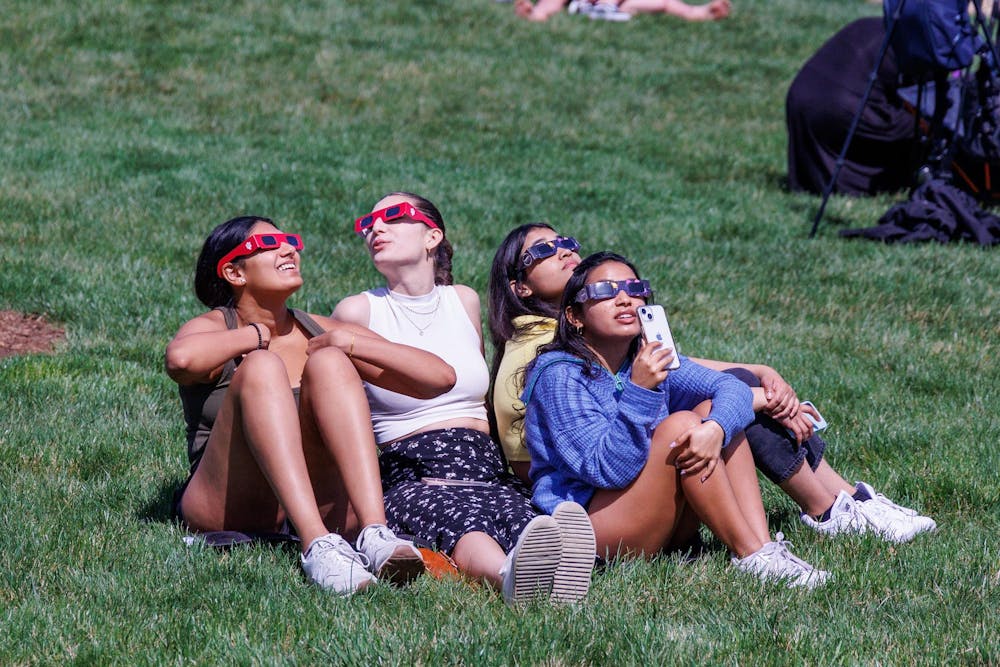Last Monday, people across a thin line of North America witnessed a spectacular event: a total solar eclipse. The last total eclipse in the U.S. was in 2017. The eclipse on Monday was slated to be much more of a spectacle than the prior, and rightfully so; the moon was almost 8,000 miles closer to Earth than the 2017 event, and the path of totality was much wider. Cities like Bloomington saw tens of thousands of viewers, and although we didn’t see as many tourists as expected, Monroe County was still a hotspot for the eclipse due to its geolocation; smack-dab in the middle of the path of totality.
Because of the sun’s harsh rays, you most likely found yourself wearing special viewing glasses to prevent eye damage. The light from the sun can burn the back of your eyes, so hopefully you wore the proper equipment. Now, with the spectacular event over with, many people, especially large families, find themselves with a plethora of solar eclipse viewing glasses sitting on the counter and have no idea what to do with them. I found myself in the same situation until it was brought to my attention that there was a much better decision to make rather than throwing them in the bin.
Companies such as Astronomers Without Borders and Eclipse Glasses USA put together their own respective initiatives to make sure those glasses see the eclipses of the future, including an upcoming annual solar eclipse in Latin America later this fall; some of the best viewing locations for this event in areas that will experience annular totality will be parts of Argentina, Chile and Easter Island. A large factor in starting these programs is to make sure schoolchildren, specifically, get to be a part of these wonderful events, because many of them don’t have easy access to the proper tools for viewing.
The easiest way to get your used glasses out of your hands is by visiting one of these collection nodes, where they will be sent, courtesy of Astronomers Without Borders, to countries across the world. Several of the drop-off locations are in Indiana — there is even one at the WonderLab Museum of Science, Health, and Technology in Bloomington.
Eclipse Glasses USA is another great source that began its “5 for 1 Program,” where for every 5-pack of glasses purchased, one pair of glasses will be sent to a school in Latin America for the upcoming eclipse later this year. They also have information on their site for donating your own used pairs.
These programs are doing amazing work specifically for children in other parts of the world, but when it comes to donating, many people struggle with the action of giving. While the amount of money going to charities has increased, Americans have been donating less and less over the years, and there needs to be a change in our way of thinking so we can overcome the difficulties that come with giving to charities. The process that comes with making charitable donations is inconvenient; the impact you make on others’ lives is worth much more than the slight inconvenience of making your way to a drop-off location or finding an hour in your day to send an envelope in the mail. Think about how such a little contribution to us will make for a life-changing experience for others. By putting forth a group effort and sending our used glasses off, we are making it so much easier for people in other parts of the world to obtain the necessary equipment to safely view the eclipse.
Before you toss your eclipse glasses in the trash, think about how amazing it was to view such a rare event. Those of us in Bloomington, especially, got front-row seats for this astronomically incredible viewing experience. Your donation can go a long way, eventually ending up in front of the eyes of a schoolchild this fall. Let’s help others in other parts of the world view the same sun we did and safely, at that.
Vincent Winkler (he/him) is a freshman studying sociology.






